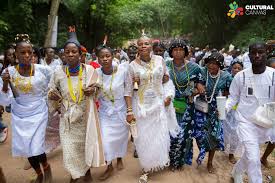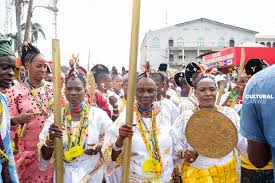Introduction
The Osun-Osogbo Festival, one of Nigeria’s most significant cultural and religious celebrations, is deeply intertwined with the traditional authority of the Ataoja of Osogbo. As the paramount ruler of Osogbo, the Ataoja plays a pivotal role in preserving the customs and spiritual significance of this ancient festival. His duties extend beyond mere ceremonial functions, as he serves as a bridge between the people and the divine, ensuring the continuity of Yoruba heritage and the worship of the Osun deity.
The Origins of the Ataoja Title
The title “Ataoja” derives from the Yoruba phrase “A-ta O-ja,” which means “one who stretches out his hands to partake in the ritual sacrifices.” This etymology highlights the Ataoja’s central role in traditional rites, particularly those associated with the Osun-Osogbo Festival. The lineage of the Ataoja dates back to the founding of Osogbo in the 14th century when Oba Larooye Gbadewolu became the first Ataoja and established the covenant with Osun, the river goddess. His trusted spiritual adviser, Timehin, played a crucial role in interpreting divine messages, leading to the establishment of annual rituals to honor Osun.
The Ataoja’s Role in the Festival
The Ataoja’s role in the Osun-Osogbo Festival is multi-faceted, involving religious, political, and cultural responsibilities. His primary duties include:
- Spiritual Leadership: As the chief custodian of Osun worship, the Ataoja leads prayers and blessings during the festival. He presides over the Iboriade Ceremony, where past kings’ crowns are consecrated at the Osun Sacred Grove.
- Guardian of Tradition: The Ataoja ensures the festival adheres to its ancient customs, resisting external influences that may dilute its authenticity. This duty has been upheld by successive Ataojas, including Oba Iyiola Oyewale Matanmi III (1976–2010), who played a key role in preserving the rituals amidst modern pressures.
- Political and Diplomatic Role: The festival attracts dignitaries, government officials, and international visitors. The Ataoja serves as a diplomatic figure, fostering relations between Osogbo and external stakeholders who support cultural preservation.
- Blessing the People: During the Arugba Procession, where a virgin girl carries sacrificial offerings to the Osun River, the Ataoja offers prayers for prosperity, fertility, and protection for the community.
Key Figures in the Evolution of the Festival
Several notable Ataojas have contributed to the evolution of the Osun-Osogbo Festival.
- Oba Samuel Oyetona Olanipekun Larooye II (1944–1976) expanded the festival’s reach, ensuring its recognition beyond Osogbo.
- Oba Iyiola Oyewale Matanmi III (1976–2010) strengthened the cultural revival, attracting global attention.
- Oba Jimoh Oyetunji Olanipekun Larooye II, the current Ataoja, has continued efforts to maintain the sanctity of the festival while engaging modern institutions in cultural preservation.
Statements from Early Actors
Historical accounts highlight the significance of the Ataoja’s role in the festival. Chief Ifayemi Elebuibon, a renowned Ifa priest, once said:
“The Ataoja is not just a king; he is the voice of our ancestors and the keeper of our covenant with Osun. Without his leadership, the festival would lose its sacred essence.”
Similarly, the late Oba Iyiola Oyewale Matanmi III emphasized:
“Osun-Osogbo Festival is not just a cultural display; it is our heritage, our connection to the divine. As Ataoja, it is my duty to uphold this sacred trust.”
Modern-Day Relevance and Challenges
The Ataoja continues to adapt the festival to contemporary realities while maintaining its spiritual core. However, challenges such as urbanization, pollution of the Osun River, and commercialization pose threats to its authenticity. Conservation efforts led to UNESCO designating the Osun Sacred Grove as a World Heritage Site in 2005, a recognition that underscores the Ataoja’s role in protecting this cultural treasure.
Conclusion
The Ataoja of Osogbo remains the heartbeat of the Osun-Osogbo Festival, ensuring the legacy of Yoruba spirituality and culture endures. His role as a spiritual leader, guardian of tradition, and bridge between past and present underscores the festival’s significance. As long as the Ataoja continues to uphold this sacred duty, the Osun-Osogbo Festival will remain a beacon of heritage, unity, and divine connection for generations to come.






